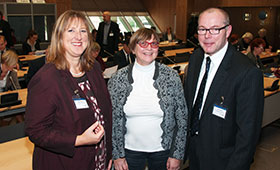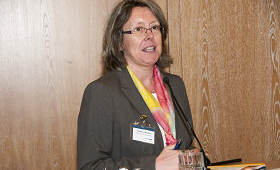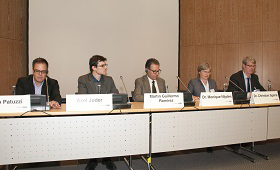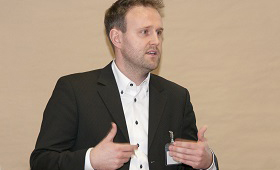From Germany’s borders to Brussels and back – cross-border vocational education and training
Vocational education and training - balancing European expectations and regional requirements
The question of the current developments in, and the outlook for, VET organisation in border regions as well as across borders formed the main focus of the European Symposium which took place on 26 and 27 November 2015 in the Federal Institute for Vocational Education and Training and which was attended by almost 100 participants from seven European countries.

Participants at the European Conference “From Germany’s borders to Brussels and back – cross-border vocational education and training balancing European expectations and national requirements” adopted a wide range of perspectives in considering the role played by vocational education and training in border regions. Cross-border VET was variously described as “a means of combating unemployment and of creating new occupational opportunities”, as “increasingly essential both for companies and for trainees and staff”, as a “building block for the improving and increasing freedom of movement of labour in the European Union” and as “a chance to abolish ‘mental’ boundaries to a certain degree and allow border regions to grow together at many levels”. At the same time, reference was made to the “major challenge and urgent task we face against the background of continuing polarisation in European regional development and increasing scepticism towards open borders in the EU”.

On 26 and 27 November 2015, just under 100 participants from seven European countries came together at the Federal Institute for Vocational Education and Training in order to debate the current developments and perspectives of border region and cross-border VET. The issues forming the main object of focus here are the extent to which requirements in border regions at a local level correlate with European objectives and instruments and the effects which can be created by cross-border activities in vocational education and training, both within the regions themselves and as “examples of good practice” on the European stage. Working groups discussed the possible nature of such developments from the perspective of a cross-border labour market, necessary general conditions and current projects. On the second day of the conference, the topics addressed were how European instruments can be linked with border region approaches and the degree to which border regions can learn from one another.

The latter is not the last of the relevant factors governing the situation in the regions bordering Germany. Germany has the most border regions in Europe by dint of the fact that it has nine neighbouring countries. In specific terms, these initial conditions are associated with direct effects for the skills requirements of companies – primarily in border areas, but also beyond. The significance of cross-border cooperation in vocational education and training became a defined strategic concept for the new millennium as a result of the Copenhagen Declaration (2002). Vocational education and training turned into the key for the establishment of global competitiveness and for the creation of a “European Education and Employment Area”. Education policy makers are reacting with a multitude of programmes and activities. The Erasmus + Programme acts as a vehicle for the funding of projects relating to cross-border initial and continuing vocational training. European mobility has been considerably expanded in recent years, and various European initiatives aimed at increasing the transparency of qualifications and improving the credit transfer of learning achievements are clear signs of this development. However, how can the objectives of European educational policy be combined with “day-to-day business” at Germany’s borders?
The intention is to expand upon the results of the conference and study these in more detail in terms of content. Publication of a relevant edited volume is scheduled for the late summer of 2016.
Welcome
Birgit THOMANN, Federal Institute for Vocational Education and Training
- Moderator: Isabelle LE MOUILLOUR, Federal Institute for Vocational Education and Training
-
Dr. Jan KAMINSKI, School Directorate Wroclaw (PDF, 2.6 MB)
-
Dr. Cécile JAHAN, AFPA Direction Régionale Alsace (PDF, 483 KB)
-
Dr. Michael SCHACK, Chamber of Commerce and Industry (IHK) Flensburg (PDF, 767 KB)
- Moderator: Marthe GEIBEN, Federal Institute for Vocational Education and Training
-
Martin FRENCH, University of Rostock (PDF, 5.8 MB)
-
Svend Erik JESSEN, Centre for Vocational Education Lolland Falster (CELF) Nykobing Falster and Frank NEEF, Chamber of Commerce and Industry (IHK) / Chamber of Crafts and Trades (HWK) Lübeck (PDF, 530 KB)
-
Wilfried KOEKKOEK / Ed CLEVERS, Regional Training Centre (ROC) Nijmegen (PDF, 1.1 MB)
-
Dr. Christiane EBERHARDT, BIBB: Mobility arrangements, school partnerships and education and training networks – on the use of European instruments as a cross-border strategy (PDF, 1.1 MB)
-
Dr. Robert NADLER, Leibniz Institute for Regional Geography: Learning from other border regions: About the relevance of regional differences (PDF, 5.4 MB)
- Website: Association of European Border Regions
- Trailer's by the German-Polish Youth Office on career prospects Trailer 1: Vocationally oriented internship abroad
- Trailer 2: The student company "Kaffee zum Glück" in Trebnitz
- Trailer 3: Insight into a vocationally-oriented project in Saxony-Anhalt
- Trailer 4: Visiting two German interns in Rogów, Poland
- Trailer 5: Internship in the agricultural sector in Germany
-
CELF; IHK/HWK Lübeck: Movie about the German-Danish cooperation (Video, 79.1 MB)
-
Tandem: Movie about the German-Czech youth exchange - mechatronics engineers (Video, 26.8 MB)
-
Tandem: Movie about the German-Czech youth exchange - educators (Video, 25.2 MB)










